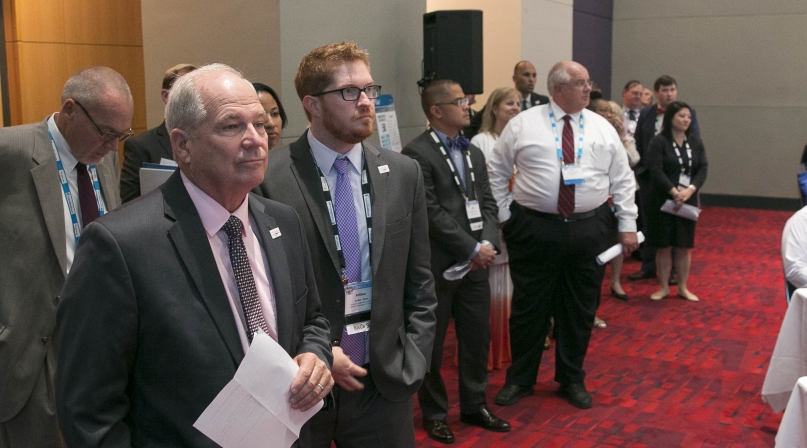Resolutions sail through approval after compromises win the day
Upcoming Events
Related News

NACo members adopted more than 100 policy resolutions at the Annual Business Meeting. What follows are the new resolutions adopted for the first time at the 2015 Annual Conference.
COMMUNITY, ECONOMIC AND WORKFORCE DEVELOPMENT
Youth Build Program
Issue: Congress is in the process of determining funding for the federal Department of Labor (DOL) YouthBuild program, which serves many counties and provides effective pathways to education, workforce training, community service and leadership training for the approximately 2.3 million low-income young adults in the United States between the ages of 16 and 24 who have left high school without a diploma or who are unemployed.
Adopted Policy: NACo supports expansion of funding for YouthBuild and supports funding for the DOL YouthBuild program returning to its prior FY 2010 level of $102.5 million.
ENVIRONMENT, ENERGY AND LAND USE
Environmental Protection Agency’s Final Waters of the U.S. Rule
Issue: The U.S. Environmental Protection Agency’s (EPA) final rule regarding waters of the United States.
Adopted Policy: NACo supports S. 1140 or other similar legislative vehicles that would withdraw the Environmental Protection Agency’s (EPA) and Army Corps of Engineers’ (Corps) “waters of the U.S.” rule and restart the rulemaking process, and would also require the agencies to work more closely with state and local governments to find consensus in a rewrite of the “waters of the U.S.” rule.
Construction of a Nuclear Waste Repository in the Great Lakes Basin
Issue: The Canadian government is currently reviewing (and has until Dec. 2, 2015 to authorize construction of) the Ontario Power Generation’s proposal to build a permanent geologic repository to bury and abandon 7 million cubic feet of low- and intermediate-level radioactive nuclear waste less than half a mile from the shore of Lake Huron in Kincardine, Ontario, Canada.
Adopted Policy: NACo encourages the president and the Secretary of State to oppose Ontario Power Generation’s proposal to build a nuclear waste repository in the Great Lakes Basin, which is not a suitable site.
FINANCE, PENSIONS AND INTERGOVERNMENTAL AFFAIRS
Water Infrastructure Finance and Innovation Act (WIFIA) and the Ban on Co-financing WIFIA Projects with Tax-Exempt Debt
Issue: The nation faces an enormous water infrastructure investment need of nearly $2 trillion over the next 25 years to restore deteriorating drinking water, storm water, and wastewater infrastructure. Congress established the Water Infrastructure Finance and Innovation Act (WIFIA) loan program in 2014 to provide low-cost loans to a broad range of projects; however, the current statutory ban on the use of tax-exempt debt to co-finance WIFIA projects substantially undermines WIFIA’s potential to advance much-needed investments.
Adopted Policy: NACo urges Congress to fully fund WIFIA and repeal the ban on co- financing WIFIA projects with tax-exempt debt, thereby freeing WIFIA to realize its full potential to lower project costs and address our nation’s immense water infrastructure investment challenges.
HEALTH
Flagged Organ Transplant Programs
Issue: Organ transplant programs are being flagged by the Centers for Medicare and Medicaid Services (CMS) for having survival rates that fall below certain statistical numbers. In some cases, programs with 94% one-year survival rates have been flagged. Flagged programs reduce transplant activity, especially for certain populations (elderly and minorities) and avoid the use of marginal organs even though patients’ survival rates would be significantly higher than not being transplanted at all.
Adopted Policy: NACo urges Congress and the CMS to put an immediate moratorium on the flagging of organ transplant programs using outcome measures. Lowering the number of programs being flagged would allow these organ transplant programs to accept more marginal organs for transplant and increase transplant rates especially for minorities and the elderly.
Needle Exchange
Issue: The use of federal funds to support syringe access programs.
Adopted Policy: NACo urges Congress to repeal the ban on the use of federal funds to support syringe access programs in order to curb the transmission of HIV, viral hepatitis and other blood borne infections related to injection drug use.
Local Efforts for Mobile Support Teams
Issue: Address the need for local health departments’ mobile support teams to work closely with law enforcement agencies to promote safety and emotional stability when a behavioral health crisis occurs.
Adopted Policy: NACo supports legislative efforts at the federal and state levels to fully fund and promote mobile support teams within a local health department. NACo urges federal and state matching funds to maximize financial support for local jurisdictions in implementing mobile support teams. Law enforcement agencies can coordinate with a mobile support team on responding efficiently to a behavioral health crisis. A mobile support team can provide immediate resources in an emerging crisis to help deescalate a sensitive situation, provide referrals for medical and social services and provide a crisis intervention.
H.R. 1769/S. 901 to Fund VA Research on the Health Effects of Toxins on the Children and Grandchildren of Veterans
Issue: This resolution calls on NACo to support federal legislation (H.R. 1769 and S. 901 are identical bills). “The Toxic Research Exposure Act” would create a toxins research unit within the VA to proceed with medical research on how exposure to Agent Orange, burn pits and depleted uranium (“toxins”) may affect the biological health of children and grandchildren of veterans who served in the military.
Adopted Policy: NACo should urge Congress to pass H.R. 1769/S. 901 to take full responsibility for understanding and addressing not just the direct impact of toxins exposure on the health of those who served our nation, but also for the inherited impacts of toxins on the health of these veterans’ children and grandchildren. The bill would create a national center to research, diagnose and treat the descendants of veterans exposed to toxic substances during military service.
TELECOMMUNICATIONS AND TECHNOLOGY
The Protection of State and Local Government Rights through Congressional Policy Efforts that Include Collaborative Input from Appropriate NACo Committee Leadership
Issue: Disparate initiatives, legislation, and regulatory rule-making by governing bodies such as the FCC and Congressional Committees are threatening local government authority. Additionally, the primary law (Telecommunications Act of 1934) that governs the entire telecommunications and technology sector should be modernized in a concerted effort to update and modernize legislation through congressional oversight. Recent regulations by the FCC as well as adopted congressional legislation at best are premature attempts to only address micro-level issues that do not align with the technological advances of our time. In fact, some of the recent rule-making by the FCC and adopted legislation in Congress have the potential to create an unsustainable path forward in our nation and could have unintended consequences on the future of the telecommunications and technology sector.
Adopted Policy: NACo strongly supports a bipartisan and concerted effort among congressional leaders, committees, federal agencies, local governments, national associations, and any other organization deemed necessary to focus on the modernization of our current law(s) and regulation(s) that govern the telecommunications and technology sector. This effort must include unbiased and non-partisan subject matter experts within the information technology and computer sciences field. We strongly believe that the issues surrounding Internet regulation, taxation, fees for services, Net Neutrality, and FCC authority can best be resolved through directing our focus toward updating existing legislation through congressional authority.
Protection of Local Government Land Use and Franchise Authority
Issue: Congressional efforts are underway to modernize and/or update the primary law (Telecommunications Act of 1934) that governs the telecommunications and technology sector. Additionally, recent regulatory activities conducted by the primary federal agency, known as the FCC, continue to increase leading to concerns of how current and future regulations might negatively impact local government authority. Of immediate concern is that of the powers and authority granted to state and local governments regarding land use and cable franchise decisions under current federal law (ref: 47 USC 332; 531; 541). In many states, local governments statutorily serve as franchising authorities.
Adopted Policy: NACo urges all federal agencies and governing bodies to collaborate with local governments, state governments, and similar associations both early and often when considering any modifications to legislation and/or regulation such as the Communications Act Update initiative in the House Energy and Commerce Committee. NACo strongly opposes any removal or modification to current federal laws and/or regulations that would remove at the very least local government authority currently granted. Furthermore, NACo strongly encourages that local governments be given ample time to consider, provide input, and collaborate with respect to any additions or modifications to current federal law and/or regulations regarding telecommunications and information technology related services.
Support the FCC Chairman Tom Wheeler’s Reforms to the Lifeline Program
Issue: A broadband connection to the Internet is increasingly essential to the economic and communication needs of all residents. Unfortunately, low-income residents disproportionately lack access to broadband.
Adopted Policy: NACo supports efforts to bring the FCC’s Lifeline Program into the digital age by expanding Lifeline to cover broadband services.
Support for Empowering Counties to Be Active in the Deployment and Operations of High Speed Internet
Issue: High Speed Internet is an essential element to modern commerce but local governments in many states are prohibited from being an active participant in the deployment of these services.
Adopted Policy: NACo supports the removal of barriers to counties supplying infrastructure to the private sector, partnering with the private sector or operating Internet services as a public utility when no commercial service is available.
Broadband Opportunity Council
Issue: Establishment of the Broadband Opportunity Council to reduce barriers to broadband deployment created by federal regulations.
Adopted Policy: NACo strongly supports the creation of the Broadband Opportunity Council (BOC) and their efforts to reduce federal regulatory barriers to the ongoing deployment of broadband capability throughout the nation. Further, we encourage the BOC to facilitate the use of publicly held infrastructure via lease and partnership arrangements with the private sector to increase the deployment of broadband to underserved areas. This is especially important in relation to any additional federally funded build-out required to meet First Net’s Public Safety requirements. Lastly, we urge the BOC to utilize the “align funding policies” section of its charter to solicit input from the broadband industry as to changes necessary to maximize the impact of the Universal Service Fee (USF) dollars on “last mile” High Speed deployment.
FCC PSAP Task Force
Issue: The Federal Communications Commission (FCC) has initiated a task force to study public safety answering point architecture which will examine whether consolidation of PSAPs would promote greater efficiency of operations, safety of life and cost containment.
Adopted Policy: NACo supports PSAP consolidation if the consolidation would result in greater public safety and increased efficiencies. Additionally, as the Federal Communications Commission’s task force on optimal public safety answering point architecture moves forward with the goal of examining whether additional consolidation of PSAP infrastructure would promote greater efficiency of operations, safety of life and cost containment, NACo would urge the FCC to consider the following:
- Redundancy and Hardening: The FCC should require redundancy between PSAPs as well as site hardening of infrastructure. The FCC should consider supporting standards for site hardening.
- Common Standard: NACo supports the NENA i3 standard for the nationwide development of NG911.
- Cybersecurity: The FCC should consider the cost of cybersecurity measures for consolidated NG911 networks and work with Congress to identify funding streams that would assist PSAPs with cybersecurity.
- Training: the task force should identify opportunities for staff training on NG911 systems.
Attachments
Related News

Announcing 2025 NACo Achievement Award Winners
NACo is pleased to announce the winners for the 2025 Achievement Awards. Through a non-competitive application process, noteworthy programs receive awards in 18 categories that cover a vast range of county responsibilities.

America’s Counties Recognize April 2025 as National County Government Month
America’s Counties this month are joining the National Association of Counties (NACo) in recognizing National County Government Month (NCGM). Throughout April, counties will honor the county workforce, educate residents about local programs and services and celebrate the county role in the intergovernmental partnership.

Celebrate 2025 National County Government Month
Join us in celebrating National County Government Month (NCGM) 2025! Since 1991, NACo has encouraged counties to utilize NCGM to actively promote county roles and responsibilities in serving residents.